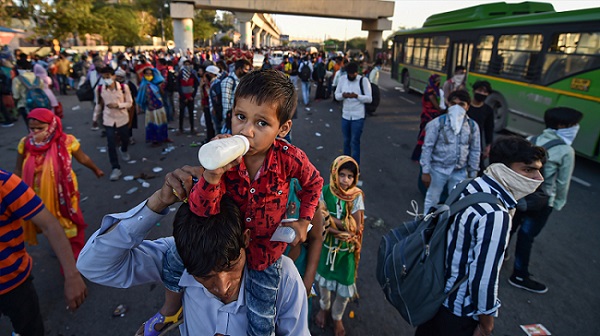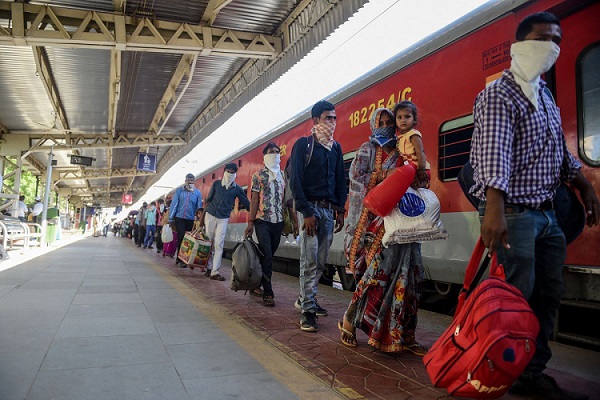
Migrants are the latest poster boys of India. The selective images of small groups of young and vulnerable — women, children, toddlers, old and infirm trudging to their homes, the mangled bodies of a few reckless migrants on railway tracks and their ruckus at bus depots and railway stations have become the staple food for print and electronic media. Arm chair commentators and political opponents are upset over these migrants’ plight and disgusted with the Prime Minister Narendra Modi whom they accuse of causing a tragedy that is far more catastrophic in terms of human sufferings than India’s partition in 1947. Will someone find out how many of them have maintained a migrant family of four and more during March-May? Perhaps, none.
In a national broadcast on March 24, PM Modi had asked his countrymen to stay wherever they were located during the lockdown period of 21 days and appealed to Indians who could afford, to adopt at least one poor and needy family. But look at how we responded. MSME, construction and home-based workers were summarily retrenched, paid nothing for their forced lay-offs, their arears were forfeited and they were thrown out of their modest dwellings for non-payment of rent.
The worst culprits were middle class lawyers, professionals, journalists, government officials and businessmen in big cities such as Delhi, Mumbai, Calcutta, Chennai, Bangalore and Ahmedabad, Surat and Jaipur. Migrants still stayed on, hoping that state governments would provide food and water but that did not happen. Instead, chief ministers of Delhi, Rajasthan, Maharashtra and Gujarat either connived or egged them to leave. When they began feeding only their domiciled workers and taking care of their medical needs, migrants decided to escape from mercenaries who only knew how to exploit them.
The sense of betrayal by employers was so acute that individual migrants began walking back to their homes in UP, Bihar, Jharkhand, West Bengal and Orissa. Distance to the destination, non-availability of transport, physical toll, hostile weather conditions, abject apathy of district administration and policemen’s baton just could not stop them.
It’s not that entire India has failed the migrants. Nearly 38,000 NGOs, hundreds of volunteers, religious organizations and ordinary folks stepped in to provide food and shelter. For example, Gurdwara Bangla Sahib, New Delhi fed 40,000 people including migrants every day. Milap took care of essentials (dry ration, pulses, spices, vegetables etc.) of 2 lakh labourers in 13 states. Mumbai’s Roti Bank fed 35,000 poor in Mumbai every day while Khana Chahiye and Zomato Feeding India fed to over 75,000 hungry mouths. Rise against Hunger India along with 5 other NGOs distributed 2 million meals a day in Bangalore and other parts of Karnataka. Akshay Patra Foundation distributed 10 million cooked meals for 21 days in Jaipur, Ajmer, Hyderabad, Pune, Ahmedabad and Bangalore. Amma Canteen in Chennai has been providing free food to 7 lakh people including migrants every day. This is only a small fraction of help that migrants have been receiving from Samaritans of India. Also, businessmen in Patiala have arranged for their slippers and food packets. Road side dhabas, petty shopkeepers, kiosks, farmers and villagers have arranged for their food, water, milk, shelter and packed lunches so that they negotiate their journey comfortably.
True, a few truck and bus operators fleeced them but there are numerous instances of truck, tractor and tempo drivers giving them a free lift. Rural India has again shown its human values in ample measures. A Delhi mushroom grower sent his farm workers to Bihar by airplane, while in Bangalore, the students of National Law College have arranged a chartered flight to ferry poor labourers to Jharkhand. Cynics of India! Do not demean your country by pamphleteering its image that is heartless, insensitive and selfish. Drive them, instead, to their homes in your personal car and nurse their bleeding feet.
Migrants have also not covered themselves with glory. They are not as hapless as they are being made out to be. They habitually save for rainy days and festivals and regularly remit money to home. With little help and empathy, they would have surely survived till they were evacuated. Everyone I saw detraining at my village station in Jharkhand, was carrying suitcases worth of ten thousand rupees, had mobile and bag-packs. No one looked famished. Moving nearly 75 lakh migrants, covering thousands of kilometres by trains and buses, was a herculean task and demanded that they show patience.
But they did just the opposite. They created riot at railway stations and bus depots, cribbed about train delays, quality of food and availability of water, vandalized trains, looted food stalls and beat up drivers, ticket checkers and station masters. It was actually a wrong decision to have given them a free ride. Not one migrant would have grudged paying if railways had simply run more trains in an efficient manner. Once it was free, everyone scrambled to leave, for no one knew when this bonanza would be withdrawn. They behaved like thugs, throwing norms of social distancing to winds. Supreme Court has surprisingly joined the bandwagon of advocates for free food and free journey. They must realize that doles do not come with only rights and zero responsibility.
A mischievous argument is in circulation that migrants should have been given the option to leave prior to the imposition of lockdown. But by March 24, migrants were still not exposed to the inhumanness of their employers or to the viciousness of Coronavirus. It is doubtful how many of them would have left their paying jobs. Moreover, moving 75 lakh odd migrants would have taken minimum 15 to 20 days. By then the initial gain of breaking the chain of infection would have gone for a toss.
It is inexplicable why PM Modi did not impose central rule in Maharashtra, Gujarat, Delhi and West Bengal as soon as the first phase of lockdown ended. By then it was clear that these states were incapable of handling the situation. If he had done so, smooth movement of migrants would not have suffered due to political squabbles, containment zones would have been more strictly policed and medical aids had reached in a more coordinated manner.
The current crisis calls for a serious introspection by the leadership in Bihar, UP, Jharkhand and Odisha. They have to create massive employment opportunities lest the lack of it creates social unrest. Their developmental priorities will have to be set afresh. If they can rope in this extra workforce in transforming the state’s industry, agriculture and infrastructure that suits the local economic genius and needs, it should bring prosperity to both migrants and the region. The task before them, of course, is not hurriedly attainable. Unemployed migrants will also not wait till eternity to find work. Having forced them to exit, employing states are now desperate to get them back. Migrants will soon forget the harrowing times they went through, the shame of being treated as disposable and replaceable beings and the fact that they would always be deprived of basic needs of food, medicine and schooling that domiciled workers enjoy.
UP Chief Minister Yogi Adityanath has been speaking of adopting a common framework of registration of migrants and ensuring minimum guarantee of security of employment and related benefits before they take up jobs in other states. It may appear a laudable initiative but may meet the fate of migrant labour Act of 1979 that is lying defunct. Policing laws in India has never been easy.
To begin with, let a few simple steps be taken to address the problem. First, a one nation one ration card for entitled migrants should be launched. Second, district administration must ensure that a migrant does not leave unless his employer issues him health and education cards enumerating facilities that he will be entitled to. The labour sourcing states can draw the terms of employments in consultation with employers, to be re-looked every 5 years. Migrants who seek jobs surreptitiously through private contractors must be denied of all such facilities.
Finally, since in India only vote counts and makes politicians listen, Election Commission must seriously consider making voter ID portable. If Aadhar card and ATM cards can be operable all over India, why not voter ID? Exercising franchise has to be truly participative for all those who have voter IDs. It cannot be difficult for Election Commission to keep updating its records and reflect changes within two months of receipt of information of change in the location from floating individuals. Imagine, the leverage that 1 crore 36 lakh migrants will wield on electoral fortunes of politicians. Then, no one would dare send them back to “Bimaroo” states. Let Election Commission begin this exercise in right earnest. It will also immensely benefit perennial migrants like me. I have not been able to vote since 1984 because I keep shifting my locations. Election Commission only has to change its mindset and move with the aspirational, digital India. I will thank COVID-19 if it can move Election Commission to do this.

